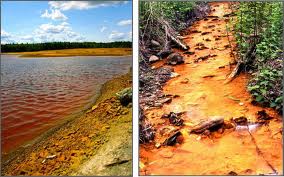Special topics
 The activities of illegal small-scale mining operators have been identified as the major source of water pollution in mining communities, especially in the Western Region.
The activities of illegal small-scale mining operators have been identified as the major source of water pollution in mining communities, especially in the Western Region.
At Nkroful in the Ellembelle District and Wassa Amenfi East District, both in the Western Region, activities of small-scale miners are a major problem — threatening the health of the people living in those communities who depend on the polluted water-bodies for their domestic use.
However, the district agencies whose duty it is to monitor and enforce the laws do not have adequate capacity to enforce the laws, and have therefore failed in the execution of their monitoring and supervision roles.
Indeed, the environmental effects and other demerits of small-scale mining operations prima facie look overwhelming. But a holistic and dispassionate look at the real issue might tempt one to side with the sentiments of the small-scale miners.
It is important however to distinguish between the licenced small-scale miners, who have been licenced under the small scale Gold Mining Law (PNDCL 218) — now replaced by sections 81 to 99 of the new Minerals and Mining Act, 2006 (Act 703)– and the illegal operators, popularly referred to as galamsey operators.
The small-scale miners have no mining equipment that will prevent water-bodies from getting polluted, yet the Minerals Commission continues to issue operating licences to them.
Mining experts describe small-scale mining as being similar to illegal mining due to the method both miners use to extract their gold. Experts further state that galamseyers are people who do gold mining independently for mining companies using crude methods such as digging pits, tunnels and sluices with their hands.
It is said that the word galamsey is derived from the phrase “gather them and sell”, which is what these artisanal miners do to survive. In practice, a small-scale mining operation in Ghana is based on a land plot measuring less than 25 acres.
There are however other indicators like work output and equipment used, which the Minerals Commission refuses to inspect before it makes recommendations to the ministry of lands and natural resource.
In Ghana the small-scale mining industry is reputed to be well over 2,000 years old and is still being treated as an informal industrial sector, even though the sector employs thousands of people who use largely rudimentary, unmonitored and uncontrolled practices which are not monitored by the environmental protection agency.
Small-scale mining activities in Ghana remained unregulated, and therefore the government does not receive any revenue from their operations
Source: B&FT